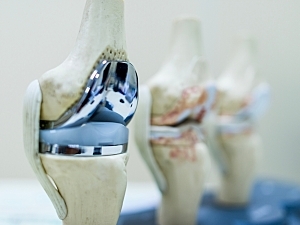Total knee arthroplasty (TKA) is being performed in an increasing number of individuals younger than 65 who have early-onset osteoarthritis (OA) or an autoimmune condition such as juvenile idiopathic arthritis.
Because patients in this age group may be more physically active and have a longer life expectancy than those 65 and older, there’s concern they will experience more TKA complications. However, research has focused on those ages 40 to 65.
Hannah J. Szapary, an MD candidate who serves as a research assistant in the Department of Orthopaedic Surgery at Brigham and Women’s Hospital, Jeffrey K. Lange, MD, a hip and knee specialist in the Department, and colleagues recently completed a retrospective study of patients who underwent TKA at age 40 or younger. They report in the Archives of Orthopaedic and Trauma Surgery that 15-year revision-free implant survival was comparable to rates in studies of older adults.
Methods
This study included 77 patients with degenerative or inflammatory arthritis who underwent 92 primary TKA procedures between January 1, 1990, and January 1, 2020, at the Brigham or Massachusetts General Hospital and had at least one year of follow-up.
The principal indication for TKA was OA or post-traumatic OA in 66% of patients and an autoimmune condition in the others. The median age at surgery was 36 and the youngest patient was 18.9 years old, making this cohort considerably younger than in any other published study.
Reoperation
Over the median follow-up time of seven years, 23% of TKAs required reoperation:
- 11 needed component revisions (8 in the OA group and 3 in the autoimmune group)
- 13 needed a non-revision reoperation (12 and 1)
The most common indications for reoperation were:
- Stiffness or arthrofibrosis (41% overall; 46% of the OA group vs. 17% of the autoimmune group, P=0.049)
- Infection (29% overall; 32% vs. 17%, P=0.049)
- Component loosening (9% overall; 7% vs. 17%)
In a multivariable analysis controlling for tourniquet time and surgical indication, no independent predictor of TKA reoperation was identified.
Implant Survival
According to Kaplan–Meier analysis:
- The overall 5-year revision-free implant survival rate was 92%
- The overall 15-year revision-free implant survival rate was 86%
- TKA indication did not significantly affect the rates, although 15-year survival was numerically lower for the OA group than the autoimmune group
Patients ≤30 years old showed no significant difference in 15-year implant survival compared with those 31 to 40 years old.
Counseling Patients
The high survival rates suggest TKA is a promising treatment to relieve pain and restore function for younger patients with OA or an autoimmune condition, even those age 30 or younger. However, the rate of reoperation is higher than in older TKA populations.
Most notably, the OA group had a high rate of reoperation for stiffness/arthrofibrosis. Early postoperative rehabilitation may be particularly important in this patient population.
